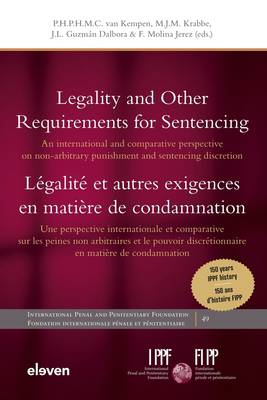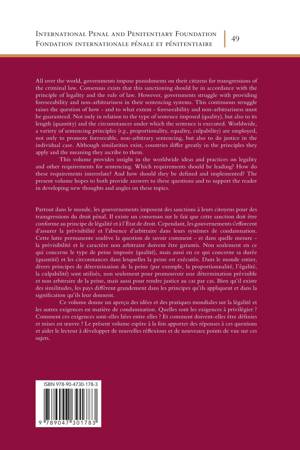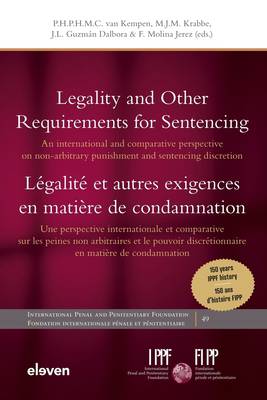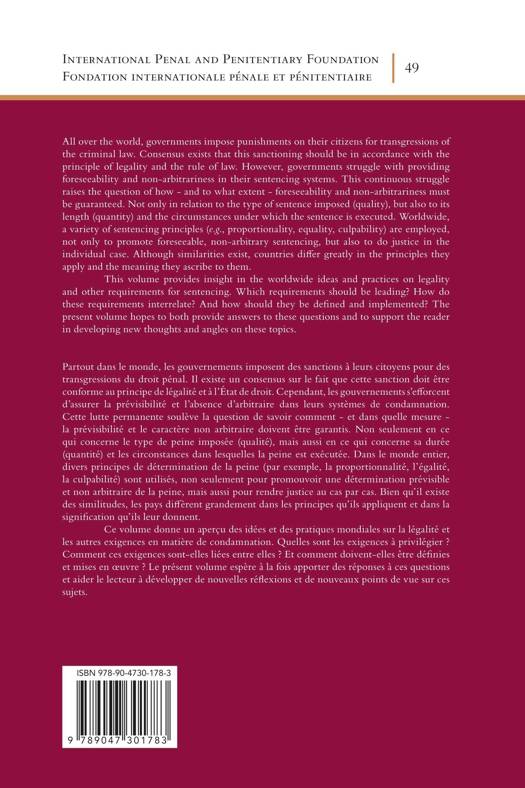
- Afhalen na 1 uur in een winkel met voorraad
- In januari gratis thuislevering in België
- Ruim aanbod met 7 miljoen producten
- Afhalen na 1 uur in een winkel met voorraad
- In januari gratis thuislevering in België
- Ruim aanbod met 7 miljoen producten


Legality and Other Requirements for Sentencing / Légalité Et Autres Exigences En Matière de Condamnation
V. Kempen Piet HeinOmschrijving
All over the world, governments impose punishments on their citizens for transgressions of the criminal law. Consensus exists that this sanctioning should be in accordance with the principle of legality and the rule of law. However, governments around the world struggle with providing foreseeability and non-arbitrariness in their sentencing systems. This continuous struggle raises the question how - and to what extent - foreseeability and non-arbitrariness must be guaranteed. Not only in relation to the type of sentence imposed (quality), but also to its length (quantity) and the circumstances under which the sentence is executed. Worldwide, a variety of sentencing principles (e.g., proportionality, equality, culpability) are employed, not only to promote foreseeable, non-arbitrary sentencing, but also to do justice in the individual case. Although similarities exist, countries differ greatly in the principles they apply and the meaning they ascribe to them.
This volume provides insight in the worldwide ideas and practices on legality and other requirements for sentencing. Which requirements should be leading? How do these requirements interrelate? And how should they be defined and implemented? An array of topics and questions is discussed regarding these requirements. Some examples: How should judicial discretion and the principle of legality be balanced? Should the execution of sentences be a matter for the judiciary or the administration? What is the relationship between the principle of legality and the prohibition against discrimination? Can human judges practice consistent sentencing? Should temporary release be a discretionary power or a right? And: How can we increase public confidence in sentencing? The present volume hopes to both provide answers to these questions and to support the reader in developing new thoughts and angles on these topics.Partout dans le monde, les gouvernements imposent des sanctions à leurs citoyens pour des transgressions du droit pénal. Il existe un consensus sur le fait que cette sanction doit être conforme au principe de légalité et à l'État de droit. Cependant, les gouvernements du monde entier s'efforcent d'assurer la prévisibilité et l'absence d'arbitraire dans leurs systèmes de condamnation. Cette lutte permanente soulève la question de savoir comment - et dans quelle mesure - la prévisibilité et le caractère non arbitraire doivent être garantis. Non seulement en ce qui concerne le type de peine imposée (qualité), mais aussi en ce qui concerne sa durée (quantité) et les circonstances dans lesquelles la peine est exécutée. Dans le monde entier, divers principes de détermination de la peine (par exemple, la proportionnalité, l'égalité, la culpabilité) sont utilisés, non seulement pour promouvoir une détermination prévisible et non arbitraire de la peine, mais aussi pour rendre justice au cas par cas. Bien qu'il existe des similitudes, les pays diffèrent grandement dans les principes qu'ils appliquent et dans la signification qu'ils leur donnent.
Ce volume donne un aperçu des idées et des pratiques mondiales sur la légalité et les autres exigences en matière de condamnation. Quelles sont les exigences à privilégier ? Comment ces exigences sont-elles liées entre elles ? Et comment doivent-elles être définies et mises en oeuvre ? Un large éventail de sujets et de questions sont abordés à propos de ces exigences. Quelques exemples: comment équilibrer le pouvoir discrétionnaire du juge et le principe de légalité ? L'exécution des peines doit-elle relever du pouvoir judiciaire ou de l'administration ? Quelle est la relation entre le principe de légalité et l'interdiction de la discrimination ? Les juges humains peuvent-ils pratiquer des peines cohérentes ? La libération provisoire doit-elle être un pouvoir discrétionnaire ou un droit ? Et: comment accroître la confiance du public dans la détermination de la peine ? Le présent volume espère à la fois apporter des réponses à ces questions et aider le lecteur à développer de nouvelles réflexions et de nouveaux points de vue sur ces sujets.
Specificaties
Betrokkenen
- Auteur(s):
- Uitgeverij:
Inhoud
- Aantal bladzijden:
- 534
- Taal:
- Engels
- Reeks:
Eigenschappen
- Productcode (EAN):
- 9789047301783
- Verschijningsdatum:
- 5/01/2024
- Uitvoering:
- Hardcover
- Formaat:
- Genaaid
- Afmetingen:
- 165 mm x 240 mm
- Gewicht:
- 961 g

Alleen bij Standaard Boekhandel
Beoordelingen
We publiceren alleen reviews die voldoen aan de voorwaarden voor reviews. Bekijk onze voorwaarden voor reviews.










